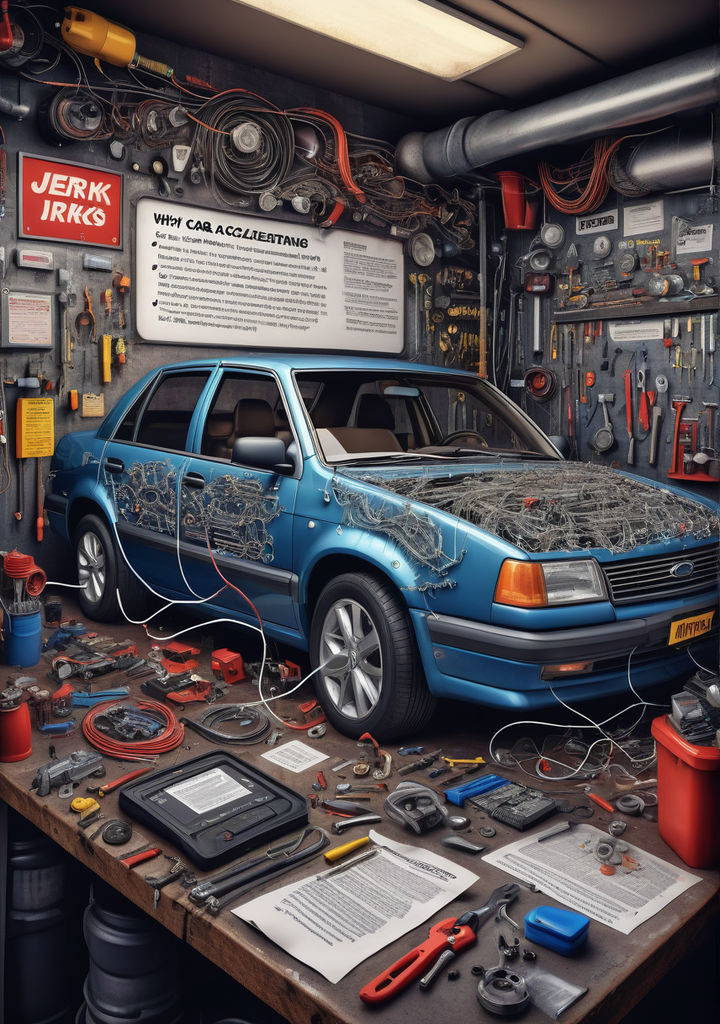
Experiencing a jerking sensation when accelerating can be alarming and inconvenient. This issue can stem from various problems, and addressing it promptly can help you avoid further damage and ensure your vehicle runs smoothly. Here’s a detailed look at potential causes, signs, and solutions for a jerking car during acceleration.
1. Common Causes of Jerking During Acceleration
1.1. Faulty Spark Plugs
- Explanation: Spark plugs ignite the air-fuel mixture in the engine's cylinders. If they are worn or fouled, they may cause irregular firing, leading to jerking during acceleration.
- Symptoms: Rough idling, misfires, and reduced engine power.
- Solution: Replace spark plugs every 30,000 to 50,000 miles. The cost typically ranges from $75 to $150 for a full set.
1.2. Dirty or Clogged Fuel Injectors
- Explanation: Fuel injectors deliver fuel into the engine. If they become clogged or dirty, the fuel flow may be restricted, causing poor acceleration and jerking.
- Symptoms: Poor fuel efficiency, engine hesitation, and uneven acceleration.
- Solution: Clean or replace the fuel injectors. Cleaning can cost between $100 and $300, while replacement may range from $350 to $900.
1.3. Failing Ignition Coils
- Explanation: Ignition coils provide the necessary voltage to the spark plugs. If they fail, they can cause misfires and jerking as the engine struggles to ignite the fuel properly.
- Symptoms: Engine misfires, poor acceleration, and increased fuel consumption.
- Solution: Replace faulty ignition coils. Costs typically range from $200 to $300.
1.4. Transmission Issues
- Explanation: Problems with the transmission, such as low fluid levels or worn components, can cause jerking or hesitation during acceleration.
- Symptoms: Rough shifting, slipping, and unusual noises during acceleration.
- Solution: Check and top up transmission fluid or have the transmission inspected and repaired. Fluid changes can cost between $100 and $200, while repairs may be more expensive, depending on the issue.
1.5. Air Intake Problems
- Explanation: Issues with the air intake system, such as a dirty air filter or a malfunctioning mass air flow (MAF) sensor, can disrupt the air-fuel mixture, leading to jerking.
- Symptoms: Poor engine performance, decreased fuel efficiency, and rough acceleration.
- Solution: Replace the air filter every 12,000 to 15,000 miles. Air filters cost between $20 and $50. If the MAF sensor is faulty, replacement costs can range from $200 to $300.
1.6. Vacuum Leaks
- Explanation: Leaks in the vacuum system can cause an imbalance in the air-fuel mixture, leading to engine hesitation and jerking.
- Symptoms: Erratic idling, reduced engine performance, and hissing noises from the engine bay.
- Solution: Inspect and replace damaged vacuum hoses. Repairs generally cost between $100 and $200.
1.7. Fuel Pump Problems
- Explanation: The fuel pump ensures the proper delivery of fuel to the engine. If it fails or becomes weak, it can cause poor acceleration and jerking.
- Symptoms: Difficulty starting the engine, loss of power, and stalling.
- Solution: Replace the fuel pump if necessary. Costs typically range from $400 to $800, including parts and labor.
2. How to Diagnose and Fix the Jerking Issue
Step 1: Check for Error Codes
- Procedure: Use an OBD-II scanner to check for error codes that might indicate the cause of the jerking.
- Cost: Scanners range from $20 to $100. Many auto parts stores offer free diagnostic services.
Step 2: Inspect Spark Plugs and Ignition Coils
- Procedure: Remove and examine spark plugs for signs of wear or fouling. Check ignition coils for proper function.
- Cost: Replacing spark plugs: $75 to $150; Ignition coils: $200 to $300.
Step 3: Clean or Replace Fuel Injectors
- Procedure: Use a fuel injector cleaner or have a professional clean or replace them if clogged.
- Cost: Cleaning: $100 to $300; Replacement: $350 to $900.
Step 4: Check Transmission Fluid
- Procedure: Verify fluid levels and condition. If low or dirty, perform a fluid change.
- Cost: Fluid change: $100 to $200; Repair or replacement: varies by issue.
Step 5: Inspect Air Intake System and Vacuum Hoses
- Procedure: Check the air filter, MAF sensor, and vacuum hoses for damage or clogging.
- Cost: Air filter replacement: $20 to $50; MAF sensor replacement: $200 to $300.
Step 6: Test Fuel Pump
- Procedure: Have a professional test the fuel pump’s pressure and function.
- Cost: Replacement: $400 to $800.
FAQ
Q1: Can a jerking car be dangerous to drive?
- A: Yes, driving with a jerking car can be unsafe as it may affect your control over the vehicle and reduce acceleration performance. It is advisable to address the issue promptly.
Q2: How often should I replace my spark plugs?
- A: Spark plugs should typically be replaced every 30,000 to 50,000 miles, but always refer to your vehicle’s manufacturer recommendations for the best interval.
Q3: What are the signs of a failing fuel pump?
- A: Signs include difficulty starting the engine, loss of power during acceleration, and stalling. If you experience these symptoms, have your fuel pump checked immediately.
Q4: How can I prevent my car from jerking during acceleration?
- A: Regular maintenance, including timely replacement of spark plugs, air filters, and fuel injectors, as well as avoiding harsh driving conditions, can help prevent jerking issues.
By understanding these potential causes and solutions, you can address the jerking issue in your vehicle effectively and ensure a smoother driving experience.
4o mini

